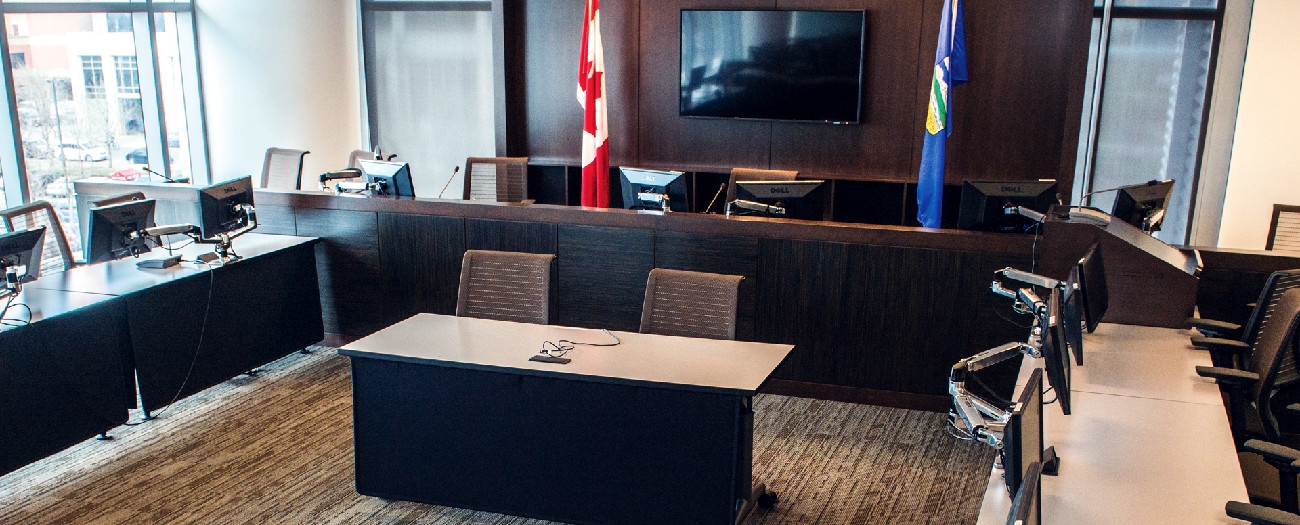How the AER upholds the law of energy development
Calgary, Alberta - January 22, 2021Ever wondered what happens in a hearing held by the Alberta Energy Regulator (AER)? Just like your favourite re-run of Law And Order, AER hearings have all the courtroom trappings you’d expect—from opening remarks made by lawyers to witnesses who give evidence. AER hearings are formal court-like processes in which important decisions on energy projects are made.
Holding the gavel
An AER hearing is a public forum where Albertans who may be adversely affected by a decision for an energy project may participate.
“We want to ensure that the process is as accessible as possible so everyone has an equal opportunity to participate. We will even travel to communities to hold the hearing to allow people to be involved,” says Dean Campbell, director of hearing services with the AER.
The AER reviews and make decisions on thousands of energy development. In 2020, the AER received over 29,000 applications. Albertans concerned about any of these applications can have their concerns heard by submitting a statement of concern to us. Concerns that cannot be resolved during the application review process may need to be resolved in other ways, which include a hearing or by way of some other process, such as Alternative Dispute Resolution.
In a traditional courtroom setting, the ultimate decision-maker is the judge. In an AER hearing, this authority resides with the hearing panel, which is selected by the chief hearing commissioner. Hearing commissioners have experience in various fields: engineering, geology, environmental science, law, economics, and mediation, and are appointed to the AER by the Government of Alberta.
Just like in a conventional courtroom, the panel makes an informed decision about an application based on a public record, which includes submissions, participants presenting evidence about the specific facts and circumstances, asking questions, and making arguments.
Appealing to a higher power
Like judicial decisions, decisions made by the AER may be appealed. However, unlike other AER decisions, decisions by hearing commissioners may only be appealed to the Alberta Court of Appeal on questions of jurisdiction or law, meaning that the AER’s authority to make the decision is in question or there may have been legal errors.
Read more about one of the AER’s most significant cases involving appeals, when in 2016, the Court of Queen’s Bench of Alberta decided against the AER and the Orphan Well Association (OWA). After losing in the Alberta Court of Appeal in a 2-1 decision, the AER and the OWA continued and won their fight at the Supreme Court of Canada in February 2018.
Taking it virtual
As with most things in 2020, the AER moved its hearing process online, hosting two virtual hearings. These virtual hearings were open to the general public via live streaming on YouTube.
“We want a smooth transition to the electronic format to give everyone equal access. We hold practice sessions and coach participants about how to get the most from a virtual environment,” says Campbell.
Campbell notes that general feedback from participants has been positive; they’re actively engaged and following the pace of the hearings.
“We want a smooth transition to the electronic format to give everyone equal access. We hold practice sessions and coach participants about how to get the most from a virtual environment,”
- Dean Campbell, director of hearing services
Grassy Mountain coal hearing by the numbers
29 days
3 platforms
6 000 pages of transcripts
40 - 60 daily participants
22 500 hours of YouTube streaming
4 600 unique viewers
Kate Bowering, Writer


